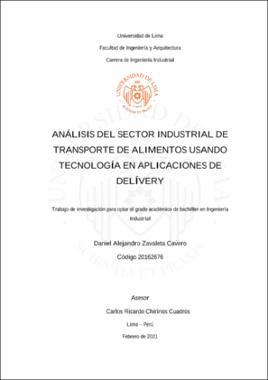| dc.contributor.advisor | Chirinos Cuadros, Carlos Ricardo | |
| dc.contributor.author | Zavaleta Cavero, Daniel Alejandro | |
| dc.date.accessioned | 2021-05-28T14:40:28Z | |
| dc.date.available | 2021-05-28T14:40:28Z | |
| dc.date.issued | 2021 | |
| dc.identifier.citation | Zavaleta Cavero, D. A. (2021). Análisis del sector industrial de transporte de alimentos usando tecnología en aplicaciones de delívery [Trabajo de Investigación para optar el grado de Bachiller en Ingeniería Industrial, Universidad de Lima]. Repositorio Institucional de la Universidad de Lima. https://hdl.handle.net/20.500.12724/13256 | es_PE |
| dc.identifier.uri | https://hdl.handle.net/20.500.12724/13256 | |
| dc.description.abstract | The sector which will be analyzed in this paper will be that of food transport using delivery platforms in the Peruvian market using 2020 as the year of study, at which time
the covid-19 pandemic broke out in the world. This market niche is made up of the union of 3 other sectors, that of food, transport, and technology; since the service that was
offered from the beginning was to mobilize food orders, using only the cell phone in an application. This same is mainly composed of 3 companies, which represent
approximately 68% of total sales; These companies are Glovo, of Spanish origin, Rappi, of Colombia, and Uber Eats, of the United States, with shares of approximately 48%, 13% and 7% respectively; contributing with the movement of 800 million soles in the economy and creating 8000 jobs. However, due to the context of the pandemic, the niche companies were forced to
work with new restrictions, of which the political and economic were the most difficult, despite the circumstances, the sector proposes to achieve a 21% rebound compared to 2019 in a post-pandemic scenario, benefiting from the avoidance of agglomerations in
the markets, but slowly due to mistrust. Niche companies have found themselves making investments since previous years, such as the creation of SuperApps, increasing offers per order, and other actions that would contribute to the recovery. | en_EN |
| dc.description.abstract | El sector el cual se analizará en el presente trabajo será el de transporte de alimento por medio de uso de las plataformas de delivery en el mercado peruano usando como año de estudio al 2020, momento en que se desató la pandemia del Covid-19 en el mundo. Este nicho de mercado se compone de la unión de otros 3 sectores, el de alimentos, transporte y tecnología, ya que el servicio que se ofreció desde el comienzo fue de movilizar pedidos alimenticios, usando tan solo el celular en una aplicación. Este mismo se compone principalmente de 3 empresas, que represen aproximadamente el 68% de las ventas totales; estas empresas son Glovo, de origen español, Rappi, de Colombia, y Uber Eats, de Estados Unidos, con participaciones de aproximadamente 48%, 13% y 7% respectivamente; contribuyendo con el movimiento de 800 millones de soles en la economía y creando 8000 puestos de trabajo. ontrado haciendo inversiones desde años anteriores, como la creación de SuperApps, incremento de ofertas por pedido, y otras acciones que contribuirían a la recuperación. | es_PE |
| dc.description.uri | Trabajo de investigación | |
| dc.format | application/pdf | |
| dc.language.iso | spa | |
| dc.publisher | Universidad de Lima | |
| dc.rights | info:eu-repo/semantics/openAccess | * |
| dc.rights.uri | https://creativecommons.org/licenses/by-nc-sa/4.0/ | * |
| dc.source | Repositorio Institucional - Ulima | |
| dc.source | Universidad de Lima | |
| dc.subject | Delivery of goods | en_EN |
| dc.subject | Electronic commerce | en_EN |
| dc.subject | Reparto de mercancías | es_PE |
| dc.subject | Comercio electrónico | es_PE |
| dc.subject | COVID-19 | es_PE |
| dc.title | Análisis del sector industrial de transporte de alimentos usando tecnología en aplicaciones de delívery | es_PE |
| dc.type | info:eu-repo/semantics/bachelorThesis | |
| thesis.degree.level | Bachiller | |
| thesis.degree.discipline | Ingeniería Industrial | es_PE |
| thesis.degree.grantor | Universidad de Lima. Facultad de Ingeniería y Arquitectura | |
| dc.publisher.country | PE | |
| dc.type.other | Trabajo de investigación | |
| thesis.degree.name | Bachiller en Ingeniería Industrial | |
| renati.advisor.orcid | https://orcid.org/0000-0001-9061-3131 | |
| renati.discipline | 722026 | |
| dc.identifier.isni | 0000000121541816 | |
| renati.author.dni | 72896978 | |
| renati.level | https://purl.org/pe-repo/renati/level#bachiller | * |
| renati.advisor.dni | 7260786 | |
| renati.juror | Vásquez Rivas Plata, Ruth | |
| renati.juror | Noriega Aranibar, María Teresa | |
| renati.juror | Cabrera Gil Grados, Ezilda | |
| renati.juror | Hernández Gorriti, Wilfredo | |
| renati.type | https://purl.org/pe-repo/renati/type#trabajoDeInvestigacion | * |
| dc.subject.ocde | https://purl.org/pe-repo/ocde/ford#2.11.04 | |
| ulima.cat | OI | |



